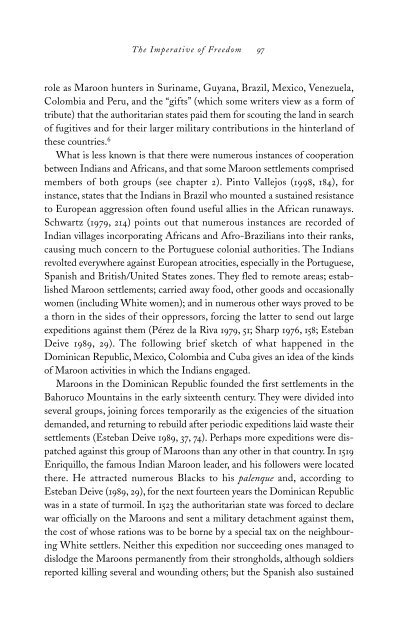60199616-flight-to-freedom-african-runaways-and-maroons-in-the-americas
60199616-flight-to-freedom-african-runaways-and-maroons-in-the-americas
60199616-flight-to-freedom-african-runaways-and-maroons-in-the-americas
Create successful ePaper yourself
Turn your PDF publications into a flip-book with our unique Google optimized e-Paper software.
The Imperative of Freedom<br />
97<br />
role as Maroon hunters <strong>in</strong> Sur<strong>in</strong>ame, Guyana, Brazil, Mexico, Venezuela,<br />
Colombia <strong>and</strong> Peru, <strong>and</strong> <strong>the</strong> “gifts” (which some writers view as a form of<br />
tribute) that <strong>the</strong> authoritarian states paid <strong>the</strong>m for scout<strong>in</strong>g <strong>the</strong> l<strong>and</strong> <strong>in</strong> search<br />
of fugitives <strong>and</strong> for <strong>the</strong>ir larger military contributions <strong>in</strong> <strong>the</strong> h<strong>in</strong>terl<strong>and</strong> of<br />
<strong>the</strong>se countries. 6<br />
What is less known is that <strong>the</strong>re were numerous <strong>in</strong>stances of cooperation<br />
between Indians <strong>and</strong> Africans, <strong>and</strong> that some Maroon settlements comprised<br />
members of both groups (see chapter 2). P<strong>in</strong><strong>to</strong> Vallejos (1998, 184), for<br />
<strong>in</strong>stance, states that <strong>the</strong> Indians <strong>in</strong> Brazil who mounted a susta<strong>in</strong>ed resistance<br />
<strong>to</strong> European aggression often found useful allies <strong>in</strong> <strong>the</strong> African <strong>runaways</strong>.<br />
Schwartz (1979, 214) po<strong>in</strong>ts out that numerous <strong>in</strong>stances are recorded of<br />
Indian villages <strong>in</strong>corporat<strong>in</strong>g Africans <strong>and</strong> Afro-Brazilians <strong>in</strong><strong>to</strong> <strong>the</strong>ir ranks,<br />
caus<strong>in</strong>g much concern <strong>to</strong> <strong>the</strong> Portuguese colonial authorities. The Indians<br />
revolted everywhere aga<strong>in</strong>st European atrocities, especially <strong>in</strong> <strong>the</strong> Portuguese,<br />
Spanish <strong>and</strong> British/United States zones. They fled <strong>to</strong> remote areas; established<br />
Maroon settlements; carried away food, o<strong>the</strong>r goods <strong>and</strong> occasionally<br />
women (<strong>in</strong>clud<strong>in</strong>g White women); <strong>and</strong> <strong>in</strong> numerous o<strong>the</strong>r ways proved <strong>to</strong> be<br />
a thorn <strong>in</strong> <strong>the</strong> sides of <strong>the</strong>ir oppressors, forc<strong>in</strong>g <strong>the</strong> latter <strong>to</strong> send out large<br />
expeditions aga<strong>in</strong>st <strong>the</strong>m (Pérez de la Riva 1979, 51; Sharp 1976, 158; Esteban<br />
Deive 1989, 29). The follow<strong>in</strong>g brief sketch of what happened <strong>in</strong> <strong>the</strong><br />
Dom<strong>in</strong>ican Republic, Mexico, Colombia <strong>and</strong> Cuba gives an idea of <strong>the</strong> k<strong>in</strong>ds<br />
of Maroon activities <strong>in</strong> which <strong>the</strong> Indians engaged.<br />
Maroons <strong>in</strong> <strong>the</strong> Dom<strong>in</strong>ican Republic founded <strong>the</strong> first settlements <strong>in</strong> <strong>the</strong><br />
Bahoruco Mounta<strong>in</strong>s <strong>in</strong> <strong>the</strong> early sixteenth century. They were divided <strong>in</strong><strong>to</strong><br />
several groups, jo<strong>in</strong><strong>in</strong>g forces temporarily as <strong>the</strong> exigencies of <strong>the</strong> situation<br />
dem<strong>and</strong>ed, <strong>and</strong> return<strong>in</strong>g <strong>to</strong> rebuild after periodic expeditions laid waste <strong>the</strong>ir<br />
settlements (Esteban Deive 1989, 37, 74). Perhaps more expeditions were dispatched<br />
aga<strong>in</strong>st this group of Maroons than any o<strong>the</strong>r <strong>in</strong> that country. In 1519<br />
Enriquillo, <strong>the</strong> famous Indian Maroon leader, <strong>and</strong> his followers were located<br />
<strong>the</strong>re. He attracted numerous Blacks <strong>to</strong> his palenque <strong>and</strong>, accord<strong>in</strong>g <strong>to</strong><br />
Esteban Deive (1989, 29), for <strong>the</strong> next fourteen years <strong>the</strong> Dom<strong>in</strong>ican Republic<br />
was <strong>in</strong> a state of turmoil. In 1523 <strong>the</strong> authoritarian state was forced <strong>to</strong> declare<br />
war officially on <strong>the</strong> Maroons <strong>and</strong> sent a military detachment aga<strong>in</strong>st <strong>the</strong>m,<br />
<strong>the</strong> cost of whose rations was <strong>to</strong> be borne by a special tax on <strong>the</strong> neighbour<strong>in</strong>g<br />
White settlers. Nei<strong>the</strong>r this expedition nor succeed<strong>in</strong>g ones managed <strong>to</strong><br />
dislodge <strong>the</strong> Maroons permanently from <strong>the</strong>ir strongholds, although soldiers<br />
reported kill<strong>in</strong>g several <strong>and</strong> wound<strong>in</strong>g o<strong>the</strong>rs; but <strong>the</strong> Spanish also susta<strong>in</strong>ed


